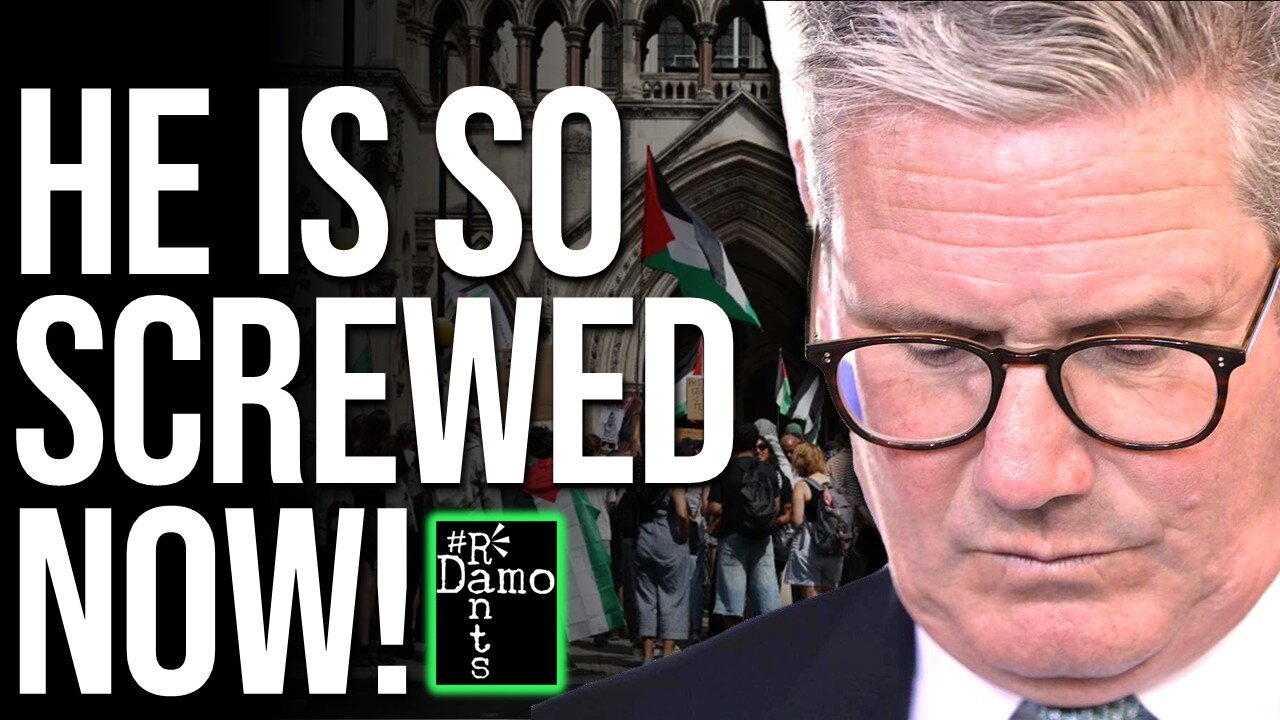Premium Only Content

Starmer’s Ban on Palestine Action Explodes — Now the Fallout Could Finish Him
Right, so when Yvette Cooper’s Home Office declared Palestine Action a terrorist organisation in July, it was meant to show strength, provide a shield to Zionism – all proof that Labour could swing the same authoritarian hammer as the Tories, only with even more pro Israel expediency. But now, the hammer has hit the handler. The Court of Appeal has ruled that the government’s ban must face open judicial review, Starmer and Co’s attempt to appeal that ruling has failed and the government is now sweating like a fishmonger’s window having made their case even weaker through this latest failure. Starmer’s “grown-up government” has stumbled into its own Kafka novel: secrecy on trial, legality in the dock, and every excuse evaporating under oath. The only terror visible now is inside Whitehall, where officials are discovering that in the end, the Terrorism Act can in actual fact cut both ways.
Right, so devastating news for Keir Starmer’s government has dropped this afternoon as the United Kingdom’s Court of Appeal issued a ruling that they really didn’t want to see written down. It allowed a full judicial review of the decision to proscribe Palestine Action under the Terrorism Act 2000. The government’s appeal against, desperate to avoid that, has failed completely. For the first time, a British court will examine whether a government can lawfully use terrorism powers against a domestic protest movement whose actions have been disruptive but not violent.
The case was brought by Huda Ammori, the group’s co-founder. The Home Office had tried to block her challenge, insisting that such matters should be handled in a closed tribunal away from public view. The Court of Appeal rejected that argument. Its judgment ensures that the legality of the proscription will now be tested in open court, where evidence can be heard and government reasoning scrutinised. In an even greater setback, Ammori’s team can now argue on two more counts arguing against the legality of the ban, so not only has Starmer’s government weakened their, case they now have to defend themselves against two more counts.
The ruling represents more than a procedural setback. It is a direct challenge to the authority of Keir Starmer’s administration, which has attempted to build what passes for its reputation on control and credibility, it is that big. The decision exposes a government that tried to bury dissent beneath bureaucracy, only to find itself dragged into the light.
When Yvette Cooper signed the proscription order back in July, she invoked the Terrorism Act’s Section 3 powers. That order made it a criminal offence to belong to or support Palestine Action, with penalties of up to fourteen years in prison. The justification was “national security,” though the record shows no evidence of violent intent. The group’s actions were acts of civil disobedience, not terror.
According to verified reports, the Joint Terrorism Analysis Centre did not recommend proscription to Cooper, but she went ahead anyway. That detail, confirmed by multiple outlets, indicates that the decision originated in politics, not intelligence. The government sought to reassert control after a series of embarrassing protests that highlighted Britain’s role in arming Israel.
Overnight, protest got redefined as extremism.
Now, with the courts demanding transparency, the same government faces the instrument it once used against others: accountability.
The offences cited—property damage, trespass, obstruction—were already covered by existing law. Using the Terrorism Act extended punishment from acts to identity. It blurred the line between public-order policing and national security.
Timing mattered as well. The order arrived as the government faced mounting criticism over its silence on Israel’s bombardment of Gaza and the UK’s ongoing export of arms components. The Brize Norton red paint incident embarrassed ministers by exposing military cooperation with Israel. The inference, which is grounded in the chronology, is that proscription was less about preventing harm and more about managing optics.
The result was immediate: arrests surged. People displaying the Palestine Action logo were questioned under anti-terror powers. Peaceful demonstrations were dispersed. A protester who once faced a fine for obstruction now risked fourteen years in prison for the same act. The deterrent effect was swift and deliberate, but also ineffective as the arrests of pensioners and people in wheelchairs made a mockery of the government’s overreach.
Palestine Action challenged the decision at the High Court, seeking an interim suspension before Parliament’s vote. The court refused that, ruling that ministers had acted within their statutory authority. The Home Office declared victory and claimed the issue settled.
But that ruling addressed only procedure, not substance. Ammori’s lawyers filed for full judicial review. When they did, the Home Office sought to divert the case to a closed tribunal, effectively removing it from public oversight. It was that manoeuvre the Court of Appeal has just struck down. The attempt to avoid daylight had produced the very exposure government ministers Cooper and Starmer didn’t want, that they feared, that their loyal media friends would provide them cover over.
The appeal judgment means that internal communications, risk assessments, and ministerial correspondence can be ordered for disclosure. Officials understand what that means. If the record shows that proscription proceeded against professional advice, as we are already told it did, the government’s narrative of national-security necessity will collapse completely. It will expose their lies and their true intent behind this, which we all largely suspect, given the donations from the Israel Lobby is all to do with Israel. If Starmer and Co pleaded national security for Israel’s sake, they’ll be exposed as showing more loyalty to that state than this one and in my view, that should politically unsurvivable. It would surely be tantamount to treason?
The court ruled that existing procedures already allow sensitive information to be protected while maintaining open justice. That left the Home Office with no hiding place. It will have to justify in public why a non-violent protest group was treated as a terrorist organisation.
Disclosure carries particular danger because it will reveal process, not just outcome. Which department initiated the move? Did any legal adviser warn against it? Was the Prime Minister informed before or after the signature? The answers will define the next phase of the crisis now before them.
The government’s messaging has remained consistent since July: that Palestine Action posed a risk to life. Yet the facts show no casualties, no evidence of planned violence, and no threat beyond disruption. The dissonance between rhetoric and record is what makes this ruling so damaging.
If the High Court finds the proscription unlawful, the consequences will be systemic. The order would have to be withdrawn, all related prosecutions abandoned, and those arrested solely under its authority released or compensated.
Over one thousand arrests and more than a hundred charges are already recorded. Even partial compensation would cost millions. More damaging still would be the precedent: ministers could no longer invoke terrorism law without clear evidential thresholds.
A judgment against the government would also constitute a formal declaration of executive overreach. For Labour, it would obliterate the image of steady competence that distinguishes it from the previous administration. The proscription was Starmerism in action—managerial authority asserted through law. If that law collapses under review, the governing philosophy collapses with it. And Starmer’s reputation as a former lawyer would be decimated no matter how many times he reminds us he was once Director of Public Prosecutions.
Even a narrow defeat would reverberate. It would show that the judiciary, long deferential to national-security claims, is no longer willing to grant automatic trust.
The challenge is not confined to Westminster of course, as I spoke about the other day. In Scotland, where criminal law is devolved, prosecutions under the same proscription order are already contested. Activists argue that enforcing the ban violates their rights to free expression and assembly under the Human Rights Act 1998. If Scottish courts agree, the order could be unenforceable north of the border, even if the government wins in London, creating a constitutional crisis.
Institutionally, the stakes are even higher. For two decades, Home Office culture has operated on the assumption that “national security” places ministers beyond ordinary accountability. A High Court ruling to the contrary would puncture that doctrine. It would compel Parliament to legislate safeguards—perhaps independent verification before proscription, or mandatory judicial review within fixed timeframes.
Such reform would represent a rare contraction of executive power in a field where expansion has been constant since 2001. Officials understand that possibility, which is why the department fought so hard to avoid an open hearing.
The Palestine Action case fits a wider pattern. Over recent years, Britain has witnessed the steady criminalisation of dissent. The Public Order Act 2023 restricted protest rights, while the Prevent strategy has extended surveillance from security threats to political activism.
The proscription of Palestine Action was a logical extension of that culture. It was designed to show toughness and decisiveness. Instead, it has exposed authoritarian reflex and that it might finally have gone too far for the system to still support it.
Labour’s leadership often equates control with competence. Yet control exercised without transparency leads to decay. The government’s insistence on managing narrative rather than confronting facts has produced exactly the scenario it sought to avoid: legal defeat accompanied by moral exposure.
Palestine Action’s case demonstrates how a law intended to prevent terrorism can be repurposed to suppress embarrassment. The judicial review will now decide whether that repurposing crosses the line from governance into illegality.
The Court of Appeal’s ruling created a constitutional turning point now. It has established that proscription decisions are subject to open judicial review—a principle never before confirmed. Ministers can still redact intelligence material, but they cannot avoid scrutiny altogether.
The High Court will now test whether Palestine Action’s actions meet the legal definition of terrorism. The definition requires serious violence or the threat of it, directed at the public to influence government policy. The verified record shows property damage but never violence against people. If the court finds that threshold unmet, as surely it must, it will conclude that the government expanded the definition of terrorism beyond its intended scope.
That finding would have consequences reaching far beyond this case. It would call into question every single prior use of the Terrorism Act against protest movements. It would also validate warnings from civil-rights lawyers that the Act’s language has become dangerously elastic and in need of tightening up.
The forthcoming hearing will involve disclosure of documents detailing how and why the July decision was made. Even partial release could reveal contradictions between internal advice and public justification. The image of government lawyers leaving the Court of Appeal empty-handed after losing the secrecy bid has already become emblematic of the shift: power moving from the executive to the judiciary, where, in legal terms is where it should be.
The content of those documents is the heart of the fear. If, as reported, the JTAC assessment did not support proscription, it will confirm that ministers acted against expert advice. That would make the proscription not only unlawful but knowingly so.
Disclosure may also expose political pressure. Correspondence between ministers, lobby groups, and defence contractors could show whether external influence accelerated the decision. The government’s insistence on secrecy fuels the inference that such links exist.
Even absent scandal, disclosure will dismantle the protective opacity on which national-security policymaking has relied on for years.
For Starmer’s administration, the reputational cost is already immediate. Whether the documents prove misconduct or simply misjudgment, the outcome is the same: the myth of unassailable competence disintegrates. What was once portrayed as strong leadership now appears as brittle authoritarianism exposed under pressure.
The legal stakes merge with political ones. A ruling against the government would trigger reform of the Terrorism Act, introduce judicial oversight before proscription, and invite compensation claims from those wrongfully arrested.
Politically, it would mark the collapse of the government’s central narrative. Starmer positioned Labour as the party of order after years of turmoil. The Palestine Action case has turned that promise on its head. The more the government insists it is acting lawfully, the more the courts and public demand to see the evidence.
Socially, the case will redefine the limits of protest. A government defeat would embolden campaigners across movements—environmental, anti-war, civil-rights—to resist intimidation under counter-terror law. A government victory would normalise the idea that disruptive protest can be treated as terrorism. Either way, the judgment will set the boundaries of dissent for a generation.
What remains uncertain is what those hidden files will show—and who, inside government, pushed the decision forward despite warnings. That unanswered question now drives public curiosity more effectively than any press release. We demand answers, we want names. We want to see them held to account.
The moral inversion at the centre of the case is stark. A government that arms an occupying power labelled the people protesting those arms as terrorists. The activists’ actions targeted weapons production linked to Israel’s campaign in Gaza, a conflict described by multiple humanitarian organisations as catastrophic. It is genocide.
There were no casualties in Palestine Action’s operations though. The goal was disruption of supply, not intimidation of the public. To call such acts terrorism is to drain the word of all meaning. The effect is to criminalise conscience and protect complicity.
The judicial review is therefore not just about legality but about moral orientation as well. It asks who the real threat to public safety is: those who protest against war crimes, or those who facilitate them.
Within Labour, the issue has reopened ideological fractures. MPs and members who warned that proscription would criminalise dissent have been vindicated. The leadership’s decision to fight transparency has deepened the sense of authoritarian drift.
For Starmer personally, the risk is existential. The proscription was his government’s signature act of security politics. It was meant to display authority. Instead, it symbolises just how fragile it is. Every procedural loss amplifies the perception that control has slipped.
Internationally, Britain’s reputation is also at stake. The United Nations and rights groups have criticised the use of counter-terror powers against pro-Palestine activism. A judicial finding of illegality would confirm those critiques and place the UK in the category of states that use security law to suppress political opposition. Positively Putinesque you might say.
Even without a final verdict, the narrative has shifted. The government’s insistence on secrecy has become the story. The longer it delays disclosure, the more the public assumes wrongdoing. Control has given way to exposure, and exposure is now shaping the political weather.
Starmer’s personal history reinforces that continuity. As Director of Public Prosecutions, he oversaw cases under the very legislation now under review. The irony is absolutely delightful because it couldn’t happen to a nicer person: the prosecutor becomes the defendant.
If the government loses, the fallout will be extensive. The proscription would be quashed, compensation claims filed, and political accountability demanded. Parliamentary committees would call for explanations. Cooper’s decision-making would be re-examined, and Starmer’s endorsement questioned. In my view their positions as ministers would be untenable.
Institutionally, a defeat would recalibrate the relationship between courts and ministers. It would demonstrate that even in matters labelled “security,” legality remains paramount. For civil society, it would prove that judicial mechanisms still function as a defence against authoritarian overreach.
Every attempt to control the narrative has instead reinforced the perception of guilt. The more the government insists that secrecy is necessary, the more its credibility disintegrates. What began as an assertion of strength now reads as an admission of weakness.
Starmer’s government has traded moral clarity for procedural control. The Palestine Action case reveals the cost of that trade. A politics that values order above truth eventually loses both. The collapse of the government’s credibility is not hypothetical; it is observable. Each court loss, each forced disclosure, chips away at the image of competence until nothing remains but fear.
Beyond personalities and party politics, the case restores a constitutional principle: that no branch of government is immune from legal scrutiny. For two decades, “national security” has been used as a shield against accountability. The Court of Appeal’s judgment has shattered that, you will be held accountable.
The High Court proceedings will test how deep that breach runs. If the judges reaffirm the independence of the judiciary in security matters, it will mark a rebalancing of British constitutional practice. If they defer to the executive, it will confirm the consolidation of unchecked power.
Either way, the Palestine Action case now stands as a benchmark. It will determine whether protest remains a right or becomes a privilege subject to ministerial tolerance. But that won’t stop protest.
What began as a bureaucratic order has become a referendum on the integrity of government itself. The facts are plain: a protest movement targeted arms factories; embarrassed ministers retaliated with a terrorism ban; the courts intervened. The sequence is uncontested, and its implications are vast.
The government’s fear is rational because the danger is real: documentation, exposure, accountability. Every sealed file is a potential indictment of judgment. When power begins to fear evidence, you know its being wielded by the wrong people.
The forthcoming High Court hearing could compel the release of materials ministers have fought to suppress. Those documents may reveal not only why the proscription was made, but who insisted on it against advice. That prospect—not the protesters, not the headlines—is what truly terrifies the government. They should be afraid. Accountability has finally come knocking.
For more on the Scottish side of this story as I went into the other day, do check out this video recommendation here as your suggested next watch.
Please do also hit like, share and subscribe if you haven’t done so already so as to ensure you don’t miss out on all new daily content as well as spreading the word and helping to support the channel at the same time which is very much appreciated, holding power to account for ordinary working class people and I will hopefully catch you on the next vid. Cheers folks.
-
 1:11:14
1:11:14
vivafrei
3 hours agoAnother Attempt on Trump? False Flag "Right Wing? Fake News? Flawed Ostrich Warrant & MORE!
94.6K32 -
 1:49:23
1:49:23
The Quartering
4 hours agoAttack At Twitchcon, Sniper Nest For Trump Found, Israel BREAKS Ceasefire, Gov't Shutdown To End?
117K59 -
 LIVE
LIVE
Film Threat
1 day agoVERSUS: BLACK PHONE 2 AND BOX OFFICE DISASTER | Film Threat Versus
87 watching -
 1:55:10
1:55:10
The HotSeat
2 hours agoNo Kings: Your Summary of Stupidity Over the Weekend
17.5K6 -
 10:36
10:36
Silver Dragons
2 hours agoThe Silver Market is BROKEN - Prepare for the INEVITABLE
14.8K2 -
 LIVE
LIVE
Dr Disrespect
6 hours ago🔴LIVE - DR DISRESPECT - BATTLEFIELD 6 - CHASING 100 KILLS
1,323 watching -
 19:53
19:53
Professor Nez
3 hours ago🚨BUSTED! JB Pritzker Just Got EXPOSED in MASSIVE Police Scandal!
25.6K24 -
 1:02:07
1:02:07
DeVory Darkins
5 hours ago $36.40 earnedDemocrats suffer MAJOR SETBACK as CNN forced to admit Trump is WINNING
122K88 -
 1:57:10
1:57:10
The Charlie Kirk Show
5 hours agoBoomer No Kings Commies Dream of Violence | Sav Hernandez, Cernovic, Gov. Youngkin | 10.20.2025
118K39 -
 LIVE
LIVE
StoneMountain64
3 hours agoBattlefield 6 is ALREADY getting BETTER
82 watching